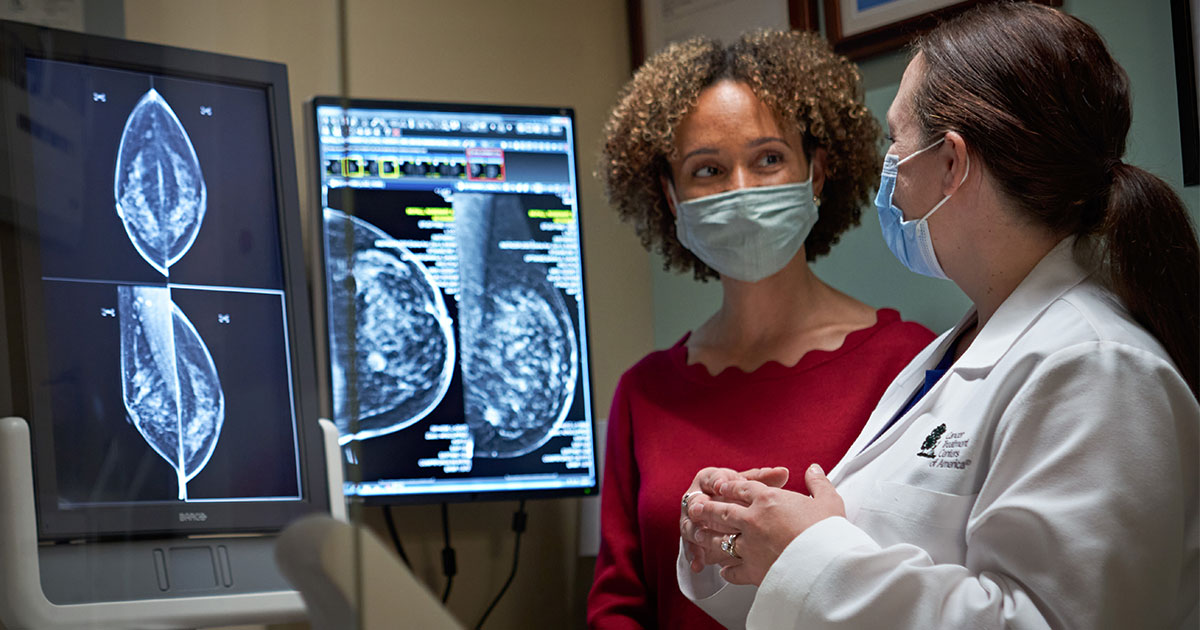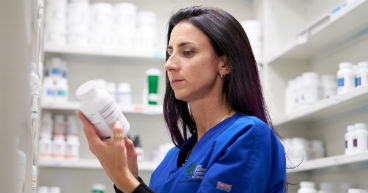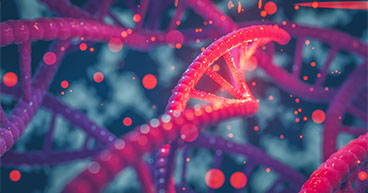
In the alphabet soup of cancer therapies, the letters ADC are producing new ways of bringing highly toxic cancer-killing drugs directly to the tumor, while limiting the damage they cause to a patient’s healthy cells.
A new cervical cancer treatment using this type of therapy, called an antibody-drug conjugate (ADC), received U.S. Food & Drug Administration (FDA) approval in September. And the February results of a clinical trial for another ADC, already in use for treating some HER2-positive breast cancers, indicate it may benefit an even wider range of breast cancer patients.
These search-and-destroy therapies include monoclonal antibodies that latch onto specific features on the surface of cancer cells. Each antibody carries a cytotoxic (cell-killing) agent—connected via a chemical “linker”—that releases the drug after the antibody attaches to a cancer cell. The ADC attack is far less indiscriminate than traditional chemotherapy, significantly reducing the toxic effect on healthy cells.
“The promise of ADCs is that we’ll be able to engineer new treatments with fewer side effects than standard chemotherapy, hopefully, with more durable responses and longer survival,” says Eugene Ahn, MD, Deputy Medical Director of Clinical Research at Cancer Treatment Centers of America® (CTCA) and a Medical Oncologist at CTCA® Chicago.
ADCs are a targeted therapy, part of the rapidly growing field of precision medicine to treat cancer. They may be an option for cancer patients who have a specific marker on their cancer cells that an ADC’s monoclonal antibody is designed to attach to.
This article, we will explore:
- How ADCs are engineered to fight cancer
- Why early ADCs fell short
- The difference between ADCs and ARCs
- The cancers that may be treated with ADC therapies
- ADCs in the treatment of breast cancer
If you’ve been diagnosed with cancer and want to learn more about treatment options at CTCA, or you’re interested in a second opinion on your cancer diagnosis and treatment plan, call us or chat online with a member of our team.
Engineering antibodies to fight cancer
The human body produces antibodies naturally. They’re one of the body’s most important defenses against infection and disease, attaching to the surface of foreign cells and triggering a signal that summons the immune system to fight the invaders.
A monoclonal antibody is created in a lab, engineered by scientists to lock onto specific antigens (proteins) that are known to populate the type of cancer cell they’re targeting and that are much rarer on healthy cells. They are used in immunotherapy and targeted therapy.
In immunotherapy, monoclonal antibodies alert the immune system to initiate an attack against an infection or disease when the body’s own antibodies aren’t doing the job. Targeted therapy allows monoclonal antibodies to do even more. Depending on how they’re designed, the antibodies may be tasked with either stopping the targeted cancer cells from growing or causing them to self-destruct.
Antibody-drug conjugates take targeted therapy to another level, with ADCs acting like heat-seeking missiles—ones that target cancer antigens. The cytotoxic agent connected to the monoclonal antibody is the payload (akin to a warhead) that’s released into the cancer cell once the antibody attaches to it.
ADCs are able to allow for much stronger doses of drugs than traditional chemotherapy because ADCs have less of an impact on healthy cells by carrying their payloads directly to the cancerous cells.
The ADC’s all-important linker
Early attempts at developing antibody-drug conjugates had disappointing results, largely because the linkers were not stable enough to get the cytotoxic agents to the cancer cells. If the toxins release early, they can kill off healthy cells instead of cancerous ones.
“One challenge is that cells often have proteases—enzymes that degrade proteins—and can split from the back end of the antibody, where the chemotherapy is bound to the antibody,” Dr. Ahn says. “We’ve discovered over time that having more stable proteins resistant to that protease will make the treatment work better. Otherwise, the antibodies can float around without the drug payload attached anymore.”
Scientists are searching for more linkers that can hold ADCs together until the antibodies have attached to the cancerous cells, giving them time to insert the payload directly into the cells.
“The antibody’s lock-and-key mechanism, by binding to very specific protein sequences, allows the chemotherapy to deliver a more surgical strike on cancer cells when the more stable the chemotherapy payload is bound to the antibody,” Dr. Ahn says. “This is a critical question related to the potential effectiveness of an ADC drug candidate.”
ADCs vs. ARCs
Monoclonal antibodies are also being used to directly bring to cancerous cells a different kind of payload—radiation drugs, in therapies called antibody-radionuclide conjugates (ARCs).
“Radionucleotide-bound monoclonal antibodies would be mainly administered by our interventional radiology team, and currently, there are a growing number of agents that are now FDA approved for either diagnosis or treatment of certain cancers,” Dr. Ahn says. “One interesting concept being developed involves specific antibody-based radionucleotide agents that help diagnose tumor subtype just from imaging. If developed with enough specificity, perhaps it may help avoid the need for a biopsy before treatment, in addition to developing potential therapeutics for cancer.”
ADCs being used to treat cancer
To date, the FDA has approved a dozen ADCs to treat cancer, with more than 100 in development in different clinical trials. The antibody-drug conjugates now available are being used to treat forms of leukemia, lymphoma, breast cancer, cervical cancer, bladder cancer and multiple myeloma. Seven received their approvals from 2019 to 2021—and only one was approved before 2011.
Currently, ADCs have been approved to treat:
- Lymphoma, specifically diffuse large B-cell lymphoma, the most common type of non-Hodgkin lymphoma; relapsed Hodgkin lymphoma; systemic anaplastic large cell lymphoma and certain cases of stage 3 or stage 4 classical Hodgkin lymphoma
- Leukemia, specifically certain cases of B-cell precursor acute lymphoblastic leukemia, relapsed or refractory hairy cell leukemia and acute myeloid leukemia in certain adults and children
- Multiple myeloma that has relapsed or is refractory
- Breast cancer, including some cases of metastatic triple-negative breast cancer, metastatic HER2-positive breast cancer, early-stage, post-surgical breast cancer and advanced breast cancer previously treated with trastuzumab and chemotherapy
- Urothelial carcinoma, the most common form of bladder cancer, that has worsened after chemotherapy and immunotherapy
- Cervical cancer that has recurred or metastasized after chemotherapy
ADCs and breast cancer
“One of the big ADC breakthroughs has been a medicine called Herceptin® (trastuzumab), which has turned a subtype of breast cancer called HER2-positive breast cancer from a bad prognosis disease to one that has one of the more favorable prognoses for breast cancer,” Dr. Ahn says.
Trastuzumab is a monoclonal antibody that, by itself, may serve as an immunotherapy that blocks cancer cells from receiving chemical signals that tell them to grow. It may be used to treat either early-stage or metastatic HER2-positve breast cancer, which have cancer cells that overexpress the HER2 gene, causing the cancer to grow and spread rapidly.
“These antibody treatments are now standard for all HER2-positive breast cancers,” Dr. Ahn says.
The ADC Trastuzumab deruxtecan (Enhertu®) combines trastuzumab with the chemotherapy payload deruxtecan. The FDA approved the drug in 2019 for some HER2-positive breast cancers, but it’s now being studied for use in triple-negative breast cancer patients, meaning cancers that are estrogen receptor-negative, progesterone receptor-negative and HER2-negative.
“The amazing thing about this drug is that not only does it work on average for more than a year after all standard chemotherapies and treatments have already been given, but research this year showed that, even for HER2-negative breast cancer, trastuzumab deruxtecan may be effective and superior to standard chemotherapy often used by oncologists today,” Dr. Ahn says.
If those findings are born out once the clinical trial is concluded, then trastuzumab deruxtecan may become a treatment for the much more common triple-negative breast cancer and others considered HER2-negative or HER2-low.
“It’s huge, because for triple-negative breast cancer, we only have one current ADC approved [sacituzumab govitecan-hziy (Trodelvy®)], which works well and superior to regular chemotherapy,” Dr. Ahn says. Having a second ADC to treat those breast cancers, he suspects, “will lead to longer survival and better quality of life for those patients.”
If you’ve been diagnosed with breast cancer and want to learn more about treatment options at CTCA, or you’re interested in a second opinion on your cancer diagnosis and treatment plan, call us or chat online with a member of our team.



